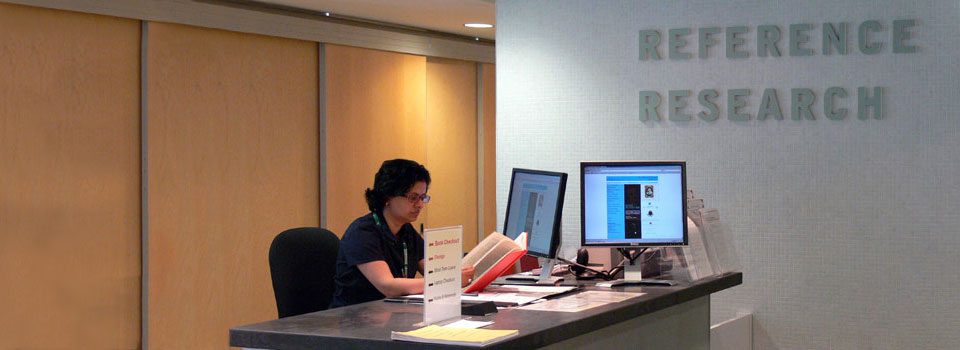How to Cite Web Resources in Assignments: A Brief Look
MLA style examples
Scholarly Project
Victorian Women Writers Project. Ed. Perry Willett. May 2000. Indiana U. 2 May. 2000 <http://www.indiana.edu/~letrs/vwwp/>.
Professional Site
Computing in the Humanities and Social Sciences. U of Toronto. 20 November, 2002 <http://chass.utororonto.ca>.
Personal Site
Cuddy-Keane, Melba. Home page. 1 May 2002 <http://www.chass.utoronto.ca/~mcuddy/>.
Book
Poe, Edgar Allan. The Murders in the Rue Morgue. London: Dent, 1912. NetLibrary. Nov. 2002. U of Toronto. 20 Nov. 2002 <http://emedia.netlibrary.com/reader/reader.asp?product_id=2011091>.
Poem
Pratt, E.J. "Erosion." E.J. Pratt: Complete Poems. Toronto: U of Toronto Press, 1989. University of Toronto Library: Canadian Poetry. Ed. Ian Lancashire. Nov. 2002. U of Toronto. 20 Nov. 2002 <http://www.library.utoronto.ca/canpoetry/pratt/poem1.htm>.
Article in a Reference Database
"Michelangelo." Grove Dictionary of Art Online. Nov. 1998. Grove Dictionary of Art. 20 Nov. 2002 <http://www.groveart.com>.
Article in a Journal
Danesi, Marcel. "The Interconnectedness Principle and the Semiotic Analysis of Discourse." Applied Semiotics 6/7 (1999): 394-401. 20 Nov. 2002 <http://www.chass.utoronto.ca/french/as-sa/ASSA-6-7/MD1.html> .
Article in a Magazine
Orlean, Susan. "Art for Everybody: How Thomas Kinkade turned painting into big business." New Yorker 15 Oct. 2001. 20 Nov. 2002 <http://proquest.umi.com/>.
Posting to a Discussion List
Merrian, Joanne. "Spinoff: Monsterpiece Theatre." Online posting. 20 Apr. 1994. Shaksper: The Global Electronic Shakespeare Conf. 20 Nov. 2002 <http://www.arts.ubc.ca/english/iemls/shak/MONSTERP_SPINOFF.TXT>.
What to include
- Name of the author, editor, compiler, or translator of the source (if available and relevant), reversed for alphabetizing and followed by an abbreviation, such as ed., if appropriate
- Title of a poem,short story, article, or similar short work within a scholarly project, database, or periodical (in quotation marks); or title of a posting to a discussion list or forum (taken from the subject line and put in quotation marks), followed by the description Online posting
- Title of a book underlined
- Name of the editor, compiler, or translator of the text (if relevant and if not cited earlier), preceded by the appropriate abbreviation, such as Ed.
- Publication information for any print version of the source.
- Title of the scholarly project, database, periodical, or professional or personal site underlined ; or, for a professional or personal site with no title, a description such as home page.
- Name of the editor of the scholarly project or database (if available).
- Version number of the source (if not part of the title) or, for a journal, the volume number, issue number, or other identifying number.
- Date of electronic publication, of the latest update, or of posting.
- For a work from a subscription service, the name of the service and—if a library is the subscriber—the name and city of the library.
- For a posting to a discussion list or forum, the name of the list or forum.
- The number range or total number of pages, paragraphs, or other sections, if they are numbered.
- Name of any institution or organization sponsoring or associated with the Web site.
- Date when the researcher accessed the source.
- Electronic address, or URL, of the source (in angle brackets); or, for a subscription service, the URL of the service's main page (if known) or the keyword assigned by the service.
Also…
In parenthetical references in the text, works on the World Wide Web are cited just like printed works. For any type of source, you must include information in your text that directs readers to the correct entry in the works-cited list (see the MLA Handbook, sec. 5.2). Web documents generally do not have fixed page numbers or any kind of section numbering. If your source lacks numbering, you have to omit numbers from your parenthetical references.
If your source includes fixed page numbers or section numbering (such as numbering of paragraphs), cite the relevant numbers. Give the appropriate abbreviation before the numbers: "(Moulthrop, pars. 19-20)." (Pars. is the abbreviation for paragraphs. Common abbreviations are listed in the MLA Handbook, sec. 6.4.) For a document on the Web, the page numbers of a printout should normally not be cited, because the pagination may vary in different printouts.
The above information is adapted from: http://www.mla.org. Please see this web site for additional information, examples and details.
Last updated: August 5, 2014
 Ask Us
Ask Us
